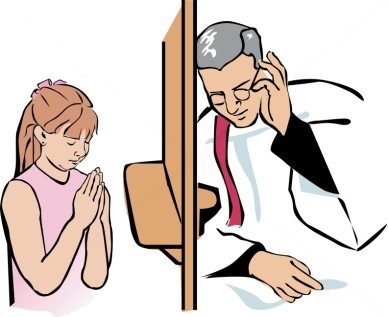The Sacrament of Confession

Origin
- Jesus Christ established the sacrament of confession to pardon the sins committed after our having received Baptism.
- Its effectiveness comes from the merits of the Blood He shed when He was raised on the cross.
-
Christ passed on this power to His successors when He told them:
“Whose sins you forgive are forgiven them, and whose sins you retain are retained.” (Jn 20:23)
Benefits
- Confession reconciles us with God, restores our friendship with Him.
- It reconciles us with the Church.
-
It frees the conscience, giving us inner peace and joy.
“Wrongdoing regretted and confessed to your God,
Much good will you gather, grace of the sacrament.
Happier you will be; the Spirit will enter
Your purified soul and your heart, passionately!”
(Marie-Paule, The Community of the Lady of All Peoples, p. 103)
What to say
- State all your serious sins, but it is very useful, too, to tell your venial sins in order to obtain an additional grace and help us correct our faults.
- Give the number of times each serious sin was committed.
- Give the circumstances, specifying (ex: I lied to… about…; I stole this thing… from such a person… in this way…, for this reason…, at such a time… and with the following persons…)
When to go to Confession
- “Whoever wants to think of his soul a little bit, let him go to confession once a month. Whoever wants to save his soul without too much fervor, let him go to confession every two weeks. Whoever wants to reach perfection must go to confession every week. More often than that, no, unless something is weighing on one’s conscience.” (Saint John Bosco to some young people)
How to go to Confession
- Have the desire to become a saint.
- “It is said that many go to confession, but few are converted. I believe that; for there are only a few who go to confession with repentance. We must spend more time asking for contrition than examining oneself.” (The Curé of Ars)
- To help us:
- Ask for our heavenly Mother’s help in our morning prayer.
- Make an examination of conscience every evening.
- A good piece of advice: Never go to bed with the soul in a state of mortal sin. Make a good act of perfect contrition if it is impossible to go to confession.
Necessary dispositions
- Regret and despise the sins committed.
- Firmly resolve not to commit them again.
- Desire to make reparation inasmuch as this is possible.
The Priest’s role
- He is not there to judge the person, but to grant forgiveness in God’s name. So, then we can be certain that God forgives us if we have the necessary dispositions.
- Concerning shame… The priest admires those who have the courage to admit their sins. Jesus said that there is greater rejoicing in Heaven over one single sinner who converts than for the 99 others who do not need conversion. The priest rejoices with Heaven…
A sacrilegious Confession
- Hide nothing!
- The confession is invalid if we hide a serious sin; then it is a sacrilegious confession. The next time, we have to confess the sacrilegious confession, all the sins that were confessed during that confession, besides all the new sins committed.
- “The sins we hide will all reappear. In order to hide one’s sins well, they must be confessed well.” (The Curé of Ars)
Examination of conscience
Before going to confession, it is necessary to make an examination of conscience. This is done by recollecting ourselves and trying to remember the sins we have committed since our last confession. It is really useful to examine oneself every day in order to avoid forgetting something or not giving enough importance to certain failings. At the end of each day, think again of all that happened during the day, that is, our spiritual victories and failures. Then, make a resolution for the next days, asking God to help us succeed in keeping it. The ten commandments are useful in doing a detailed examination of conscience. See:
Examination of conscience with the ten commandments